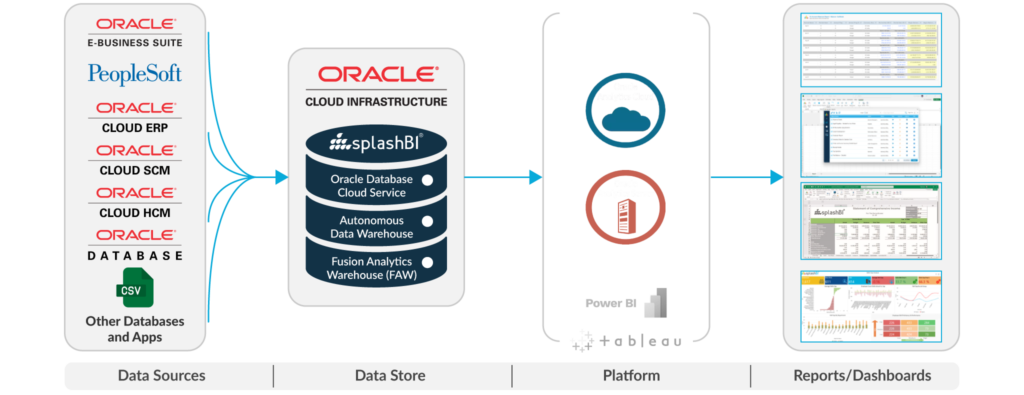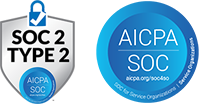Data Replication from Oracle Fusion Cloud to Data Warehouse

Extracting data from SaaS applications has consistently been a challenge, and Oracle Fusion is no exception. Existing extraction mechanisms produce CSV/text files, making it difficult to analyze and integrate into business workflows.
SplashBI’s cutting-edge Oracle Fusion Data Pipeline addresses this issue by offering an automated, table-to-table replication solution. It efficiently extracts data from Oracle Fusion and makes it accessible in industry-leading databases like Oracle, Snowflake, Azure SQL, Amazon Redshift Microsoft SQL Server and more!
Trusted by Leading Brands






Why Oracle Fusion Cloud Data Pipeline?
Democratize Data Integration
Data Pipeline facilitates integration of Oracle Fusion data into data warehouses, on-premises systems, data lakes, or legacy applications, ensuring smooth connectivity.
Enterprise Reporting
Utilize data extracted from Oracle Fusion to develop business analytics with tools like Tableau, SplashBI, PowerBI, and more.
Data Consolidation
Consolidate Oracle Fusion data with other sources such as Salesforce, Workday, UKG and many more.
Scalable Incremental Data
Advanced multi-threading, fault-tolerant algorithms to support incremental data loads.
Case Study
A leading Cloud Security Company needed data from Oracle Fusion Applications to facilitate enterprise reporting using their Snowflake data warehouse. They tried multiple existing solutions but neither could replicate data into Snowflake warehouse, forcing the IT team to rely on manual CSV file uploads.
As data volumes increased over time, handling CSV files became increasingly challenging and prone to errors. To ensure future scalability, the company decided to implement SplashBI’s Oracle Fusion Data Pipeline.
The new strategy involves scheduling the Data Pipeline to extract data regularly, automatically populating the Snowflake data warehouse. For specific fast-moving tables, data will be extracted from Oracle Fusion on-demand, as required by business leaders. Their enterprise reporting tool’s Snowflake compatibility together with SplashBI Data Pipeline’s extraction capabilities will empower comprehensive business analytics for their users.
Challenges
Fusion data required for comprehensive enterprise reporting.
Existing solutions unable to connect to Snowflake Database.
CSV extraction and consumption was cumbersome.
Solution
Utilize SplashBI’s Oracle Fusion Data Pipeline to extract and replicate data directly into Snowflake.
Eliminate the need for CSV manipulation.
Schedule data extraction for increased efficiency.
Case Study
A large public school system migrated to Oracle Fusion Applications from a legacy Microsoft ERP. They sought a scalable solution for PowerBI Enterprise reporting and cross-application reporting with on-premises systems.
Initially, business users Oracle Fusion’s built-in reports, manually exported data to Excel spreadsheets, and combined these spreadsheets with other sources in PowerBI. This labor-intensive process consumed a significant amount of time and effort.
Retrieving data. Wait a few seconds and try to cut or copy again.
Challenges
Utilize Oracle Fusion data for PowerBI analytics.
PowerBI connects with Microsoft SQL Server Database but does not connect with Oracle Fusion.
Out-of-the-box data extraction solutions can’t replicate data into on-premises Microsoft SQL Database.
Solution
Extract Fusion data into MS SQL Server database using SplashBI’s Oracle Fusion Data Pipeline.
Automate extraction, saving countless man-hours.
Leverage in-house talent that is skilled in Microsoft technologies to develop enterprise reporting in PowerBI.



